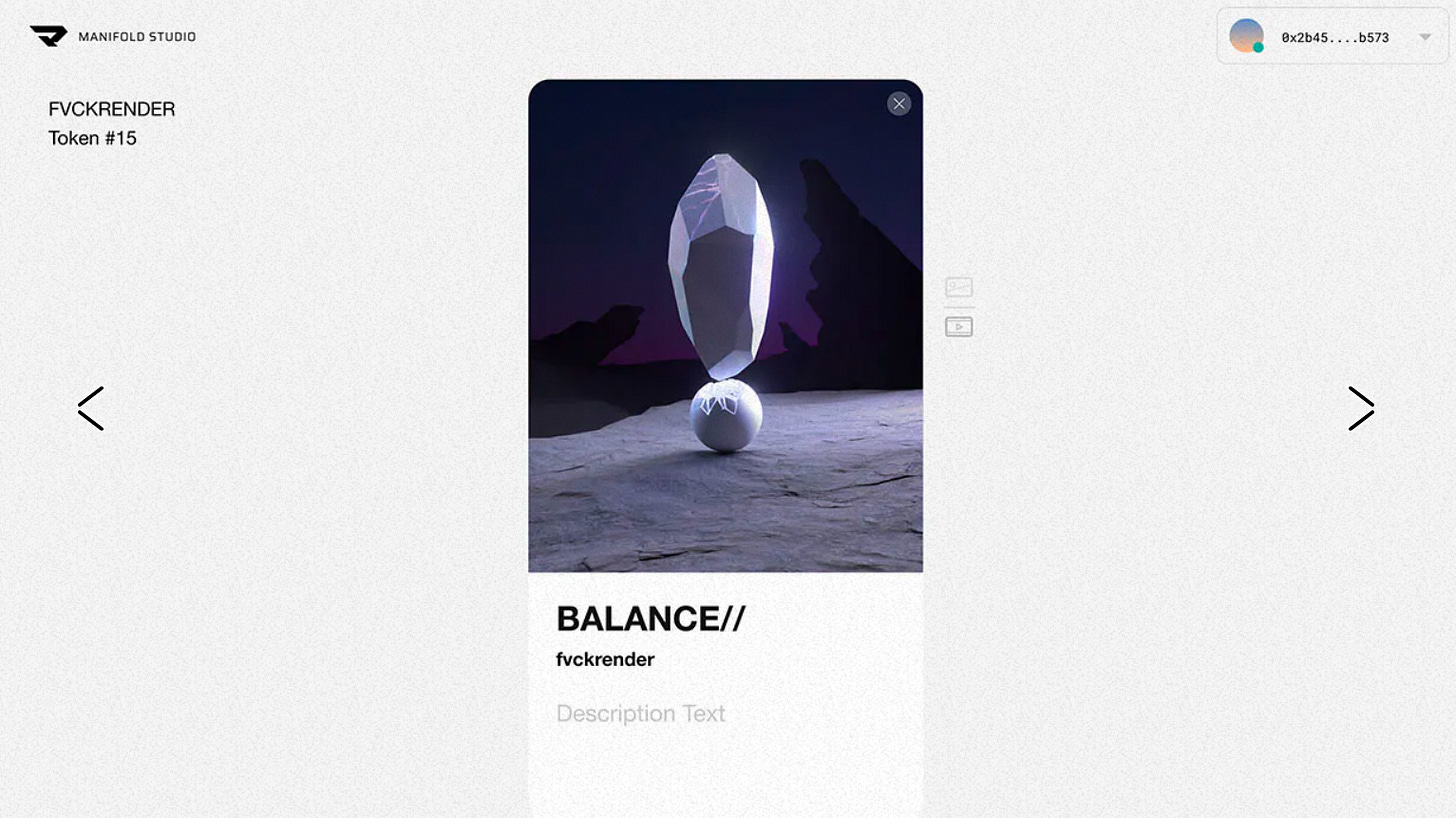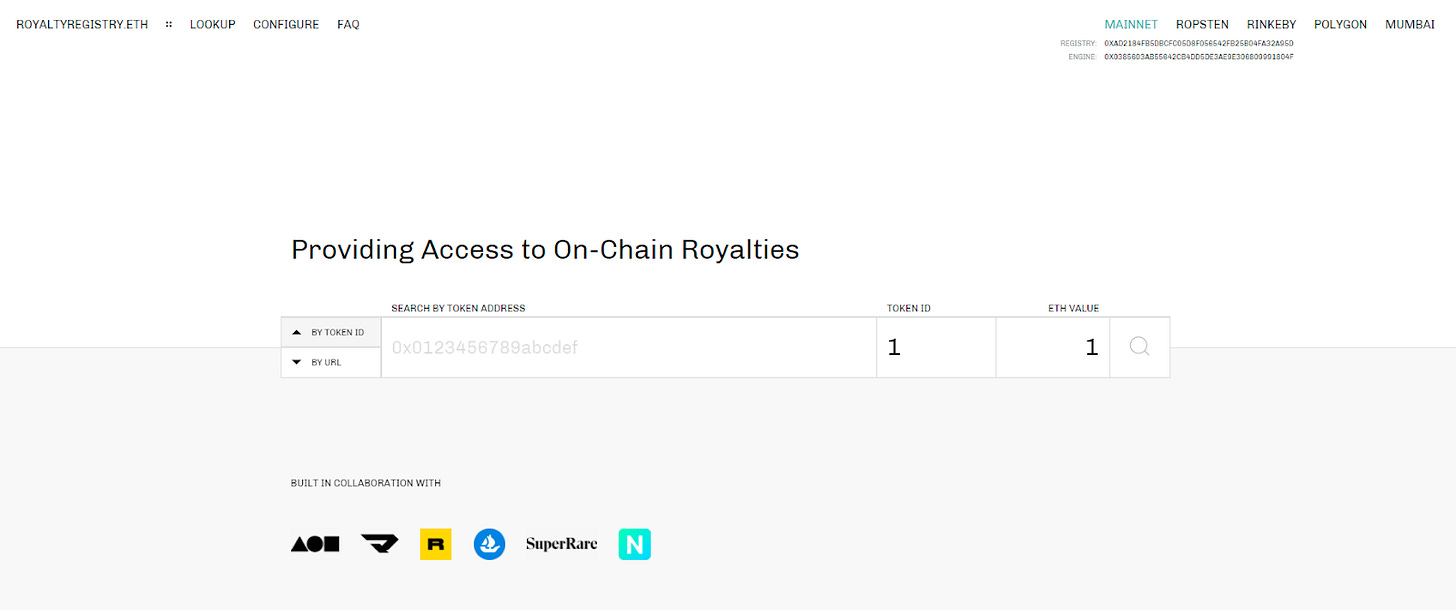Meet Manifold 🎨
Minting NFTs via creator-owned contracts!
Metaversal is a Bankless newsletter for weekly level-ups on NFTs, virtual worlds, & collectibles
Dear Bankless Nation,
I’ve been watching Manifold with great interest lately.
In short, the project helps creatives own their own custom-tailored NFT minting infra.
Manifold streamlines the tech details, i.e. ensuring robust on-chain provenance and marketplace interoperability, so creators can focus on minting instead of racking their brains on how to devise their own high-quality NFT smart contracts.
All that said, interest in Manifold has risen considerably in recent months, yet the project still remains somewhat under the radar. Let’s take a closer look for today’s post!
-WMP
🙏 Sponsor: Zerion—Your Gateway to the Metaverse✨
Manifold explained
Manifold isn’t a run-of-the-mill NFT platform. Instead, it centers around the specialized Manifold Creator smart contract system, which facilitates creator-owned NFT minting.
What is creator-owned NFT minting, you ask? 👨🎨️
This is when a creator can mint NFTs through their own bespoke smart contract that only they can use and extend, in contrast to the “shared contract” model that’s become popular in the NFT ecosystem. As Manifold has previously explained:
“Currently, creators typically mint NFTs using the same platform that sells their NFT (eg. OpenSea, Rarible, Foundation). As a result, your NFT is a product of a third party’s minting contract: behind the scenes, your NFT is assigned a random ID by the platform (like Amazon assigns products with random SKUs). Further, your work is listed next to other NFTs using the same contract, oftentimes, completely unrelated.
For creators and brands who place value on their brand and work, we think it’s important for creators to distinguish their name in this chain of provenance. Your work should stand out based on your name, rather than get lost in the sea of NFTs.”
Manifold Creator grew out of white-label infra collaborations with leading crypto artists like FVCKRENDER, Mad Dog Jones, and Pak. Unveiled as an open-source resource in May, the Creator system emphasizes three main assurances: authenticity (i.e. decentralized permaweb provenance), extensibility (i.e. composable with NFT apps), and interoperability (i.e. compliant with popular NFT market standards.)
The extensibility factor
One of the most interesting things about Manifold Creator is how it offers extensibility via extensions, which the Manifold team hails as like endlessly customizable plugins for NFTs.
As such, extensions — which can only be approved by creators — offer the ability to “design new blockchain logic in separate smart contracts that can interact with their original creator contract to produce custom NFTs.”
The result? A minting system with advanced and dynamic capabilities.
Manifold Studio
The idea all along has been to open up the Manifold Creator system to everyone. A step in that direction came earlier this month when the project’s team introduced Manifold Studio.
Manifold Studio is Manifold Creator under the hood + “a seamless user interface to mint your own NFTs with zero coding required.”
The Studio suite remains in early access mode (you can sign up for the waitlist here), so it’s not available to everyone just yet. But in time it will allow anyone to readily deploy their own customized NFT smart contracts to Ethereum.
Moreover, in supporting everything from attribute customization to unlimited file sizes, Studio will provide excellent DIY guarantees to creators going forward.
Check out the Royalty Registry, too
Last week, Manifold announced the Royalty Registry.
A collaboration with Foundation, Nifty Gateway, OpenSea, and beyond, the Royalty Registry is a smart contract aimed at helping NFT marketplaces readily support on-chain royalties across platforms.
The problem hitherto? Infra fragmentation. In other words, when a creator mints an NFT on one platform but it sells on another, their programmed royalty may be missed by the secondary project.
Accordingly, the Royalty Registry is a way for NFT platforms to avoid missing royalties regardless of where NFT sales occur. As Manifold has noted:
“Our Royalty Engine is a contract that provides an easy way for any individual or marketplace to look up royalties for any given token contract. If a token contract has set an override in the Royalty Registry, it will use that information. Otherwise, it will attempt to use royalty information from supported specs including EIP2981, Rarible, Manifold, SuperRare, and Zora.”
This is the kind of public good that NFT creators and projects can benefit from for years to come. Hats off to Manifold and the other teams involved for moving the needle forward here.
Action steps
👀 Check out manifold.xyz
📑 Check out royaltyregistry.xyz/lookup
Subscribe to Bankless. $22 per mo. Includes archive access, Inner Circle & Badge.
🙏Thanks to our sponsor
ZERION
With Zerion, you can invest in DeFi from one place—now fully revamped for your NFT collection!
So you spent months building up your collection, but you’re still viewing your NFTs on a website that looks like it’s stuck in 2015? Have some fun with Zerion – send NFTs between wallets, convert them to iPhone widgets and flex them on your Apple Watch - all alongside your entire crypto portfolio.
👉 Look out for Zerion’s L2 Support & Cross-Chain Composability.
👉 Connect Your Wallet & Show Off Your NFT Collection.
Not financial or tax advice. This newsletter is strictly educational and is not investment advice or a solicitation to buy or sell any assets or to make any financial decisions. This newsletter is not tax advice. Talk to your accountant. Do your own research.
Disclosure. From time-to-time I may add links in this newsletter to products I use. I may receive commission if you make a purchase through one of these links. Additionally, the Bankless writers hold crypto assets. See our investment disclosures here.






